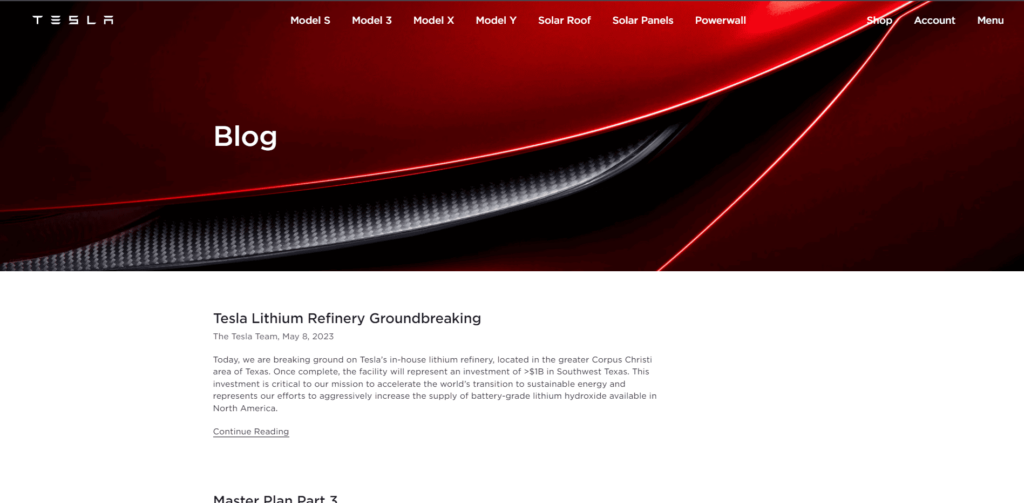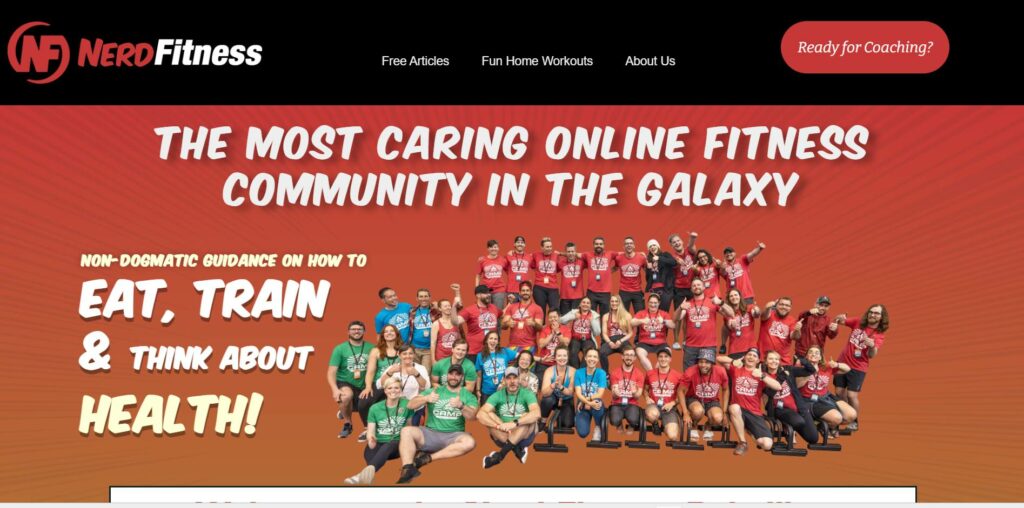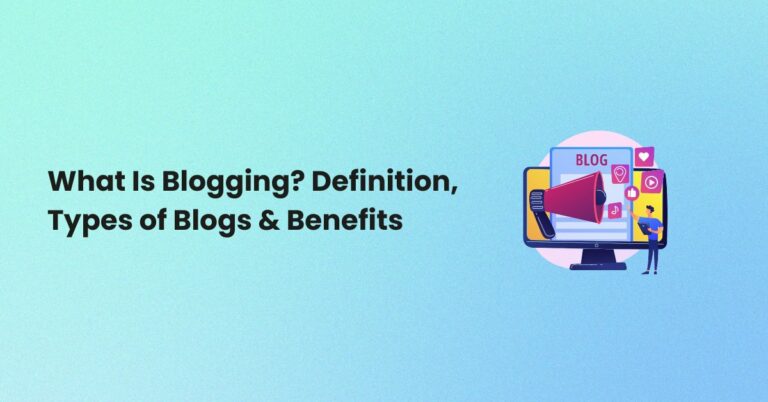Blogging has become one of the most crucial areas for individuals and businesses to share information, express opinions, and reach their target audiences worldwide.
But, What is Blogging? And why has it gained such immense popularity in the digital world? Let me explain in this article.
So, In this guide, I will explain every aspect of blogging, from its definition and purpose to setting up your blog.
Let’s dive in together.
What is a Blog?
A blog is an online journal or informational website with articles or blog posts published by individuals on various subjects or topics, that help to solve people’s problems with the updated information.
And, all the published articles will be formatted in chronological order, where the most recent posts appear at the top of the blog.
What is Blogging?
Blogging refers to maintaining the blog as an informational website by regularly publishing articles on a particular industry or niche.
It means on your blog, you can share your personal experiences, hobbies, professional advice, news, etc.
By showcasing your experience, expertise, to your target audience and solving the people’s problem through the content on your blog.
Why has Blogging Become Popular?
There are various reasons why blogging has gained such immense popularity.
The first reason is it provides individuals with a platform to express themselves, share their ideas with a global audience, connect with like-minded people with similar interests, and more!
And, as per Optinmonster blogging statistics, approximately 409 million people view more than 20 billion pages monthly to find information for their problems.
This demand made individuals and businesses focus on blogging by regularly publishing high-quality blog posts related to their audience.
This is process helping the bloggers or businesses to improve their search engine rankings, making their websites more discoverable by potential customers.
In the past, blogging was called a side hustle or to earn passive income for the individuals.
But now, blogging has become an asset for individuals and businesses seeking to engage with their target audience and create value through content, establish brand identities and develop strong relationships.
Understanding Different Types of Blogs
There are a few different types of blogs, each serving its purpose while appealing to diverse audiences.
So it means, knowing more about your audience will help you choose the appropriate strategy for your blogging journey.
Let’s examine three popular types:
- Personal Blogs
- Business Blogs
- Niche Blogs
1. Personal Blogs
Personal blogs are simple blogs created by individuals to share opinions from their personal experiences, thoughts, and reflections on various topics.
So, people use or create personal blogs to document daily lives, share their travel adventures, express opinions, or connect with people who share similar interests.
Example of Personal Blog: Gatesnotes.com

Personal blogging offers many advantages, it gives freedom to talk and deliver creative expression on the topics which you like most.
It also helps to improve your creativity and writing skills which reflect upon life experiences and build an online personal brand, which helps to draw readers and resonate with your unique voice and views.
2. Company Blogs
Company blogs are for companies that help in their marketing strategy by sharing product or service updates and industry insights while engaging customers directly.
It means, these blogs help companies establish customer credibility, increase brand awareness, and drive website traffic from search engine results pages.
Example of the Company blog: Tesla Blog

By regularly publishing informative and valuable blog posts on business blogs, that position them as industry leaders and build trust among their target customers
Furthermore, blogs increase search engine visibility and bringing organic traffic as potential new customers.
3. Niche Blogs
Niche blogs are for individuals specializing in specific subjects, topics, or interests targeting a particular audience set.
These blogs focus intensely on one subject matter, providing valuable advice, insight, and information for readers who share the similar interest.
Example of Niche Blog: Nerdfitness.com

Some of the broad niche blogs include fashion, food, travel, technology, etc; which can also be narrow down into micro or macro niche blogs like, fashion for men, vegetarian food, etc.
And, Niche bloggers typically own deep expertise in their respective fields and offer insightful analysis and unique perspectives on specific topics to help readers solve their problems.
If you want to make money from the blog, I suggest you to start a niche blog where you share your experience and thoughts on a particular niche with your target audience.
And if everything goes fine in the long run, you can turn your niche blog into main profitable business.
Structure of a Blog
The structure of a blog will be pretty simple and remains consistent for every blog website out there.
Blogs have certain standard features and structures which contribute to an organized, user-friendly layout, making it easy for visitors to engage with the content.
A blog structure typically consists of 4 main areas.
1. Header
This section is the topmost area that holds the blog’s logo, menu, and navigation bar to allow visitors to navigate between various sections.
2. Main Content Area
This area is the center place that displays recent or featured blog posts in a visually attractive way that helps visitors to access the content easily.
3. Sidebar
The sidebar may include extra elements like social media profiles, popular posts, subscription options, or call-to-action buttons for the visitors to take any desired action.
4. Footer
This section is at the bottom website as a footer providing relevant information such as disclaimers, privacy policies, and any links leading to important pages on a blog to the visitors.
So, you must always use these structural elements to provide visitors with a seamless user experience that makes finding information easy and builds trust.
Difference Between Blog and Website
There is a quiet difference between a blog and website. In simple, a blog can call as a website, whereas a website cannot be called a blog.
Let me give you clarity by considering critical factors in the picture.
| Blog | Website |
|---|---|
| Blogs are dynamic in place, you need to update new articles regularly and consistently. | Website is like static pages, which doesn’t require regularly updating new content to the pages. |
| Blog encourages your target readers to engage and ensures that visitors always find fresh content to explore on your site. | As a static page, the website has few options for users to engage, find fresh content and to share their thoughts. |
| Blog posts have different byline elements, such as publishing dates, categories, tags, and author references. So, all these elements contribute to the blog’s chronological and categorized structure. | And website does not have all the byline elements such as publishing date, author reference, categories, and tags, because all the pages are static. |
| Ultimately, you can call any individual blog as a website or blog website. | Here, a website cannot call as a blog because, in a particular business website, a blog adds as a part of the marketing strategy. |
Benefits of Blogging
Blogging offers many advantages for individuals and businesses. Let’s examine some of the benefits of blogging below.
1. Personal Expression
Blogging allows everyone to express their thoughts, ideas, and creativity freely. It helps to showcase your writing abilities, artwork, or any other form of expression with blogs.
Blogging also encourages or allows individuals like you to share your unique perspectives with the world and reach a broader audience.
2. Establish an Online Presence
Blogging provides individuals and businesses with a powerful way of creating an online presence.
By consistently publishing valuable content, you can establish yourself as an authoritative figure in your field and gain a loyal audience.
And, by networking with like-minded people, you can establish an effective online presence that helps to unlock exciting opportunities such as collaborations, speaking engagements, and career advancement.
For businesses, establishing an effective online presence by creating blog posts on business can tremendously gain brand recognition, credibility, and customer trust.
3. Niche Expertise
Blogging allows you to become a niche expertise and helps you to reach a wider audience, and connect with people who are interested in the specific field.
It means you can share your knowledge and expertise with others by offering helpful information, tips, or advice about a particular niche that you have experience, which ultimately benefiting readers.
By sharing your expertise with blog posts, you can gain a trusted authority and expertise in your field in front of your target audience.
4. Generating Income
Blogging offers one of the most significant advantages for individuals to create passive income streams through display advertising, sponsored content, affiliate marketing, and selling digital products or services.
Building a profitable blog takes time, hard work, and dedication, and if you have patience with all the right efforts, the returns can be significant.
As your blog gains some traction with readers, new opportunities may present themselves for monetizing your blog and making it an income stream.
How to Make Money With a Blog ?
There are various ways to make money with your blog if it once established an online presence.
Below are a few ways you can monetize your blog.
1. Display Ads
The number one and easy way to monetize blog is, by displaying ads on the blogs privately or through platforms like Google AdSense.
Advertisers will pay a certain amount to display their advertisements on your blog, which creates a passive income stream through your blog.
2. Affiliate Marketing
The second popular method for every blogger to monetize is by doing affiliate partnerships.
You can partner with your niche-related companies and promote their products or services through affiliate marketing.
And, if some purchases the product or service, you will get a commission on each sale or lead generated from your affiliate link.
3. Sell Digital Products
The other best way to monetize your blog is to sell digital products to your target audience or visitors.
As a blogger you can sell your digital products such as eBooks, Templates, online courses or tutorials created from your expertise directly to readers of your blog based on your audience needs.
4. Sponsored Posts
Once your blog gets some traffic and popularity, you may receive offers to write sponsored posts or reviews from other companies within your particular niche.
Sponsored posts involve collaborating with brands and getting paid to feature their product or service within your content.
5. Offer Services
As a blogger, you can also offer services or consultations to your target audience from your blog, especially if you’re into a service-based niche.
Be it any niche, you can offer consultation to the target audience or users from your experience.
These are the few ways to monetize your blog, and there will be more opportunities once your blog gets authority and traffic within your niche.
You need to understand, monetizing a blog requires significant investments of time, energy, and high-quality content.
Building loyal audiences and developing credibility are crucial prerequisites to effective monetization.
How to Start a Blog ?
Starting your blog can be relatively straightforward. Here are the essential steps you need to take care.
1. Choose a Niche
The first and crucial step is finding a perfect niche where you’re interested and passionate about producing content with prior knowledge.
Selecting a particular niche will help you target a specific audience by establishing yourself as an authority.
This step is crucial because you cannot choose a random niche to start your blog.
If you select a random niche, for sure, you will give up in the middle and cannot make money from your blog.
2. Select a Right Blogging Platform
Once you have chosen the niche, you must select the right blogging platform based on your goals.
There are different blogging platforms exist in the market, such as WordPress, Blogger, Medium, or Squarespace to start your blog.
But, WordPress is the topmost CMS platform with 41.28% market share worldwide, and it is the best choice to start your blog.
It is a highly flexible blogging platform widely utilized by bloggers due to its many features and customization options.
At the same time, other blogging platforms will not provide that many customizations to your blog, so the WordPress will be the best choice for you.
3. Choose and Register Domain Name and Hosting
In this third step, you must invest in a domain name and hosting service for your blog, based on your niche and blogging platform.
A domain is the name of your blog website and Hosting is the database server where your blog files will be hosted to give access to your visitors.
While buying a domain, ensure it should be pretty simple and easy to pronounce according to your niche.
And, when investing in hosting, look for a provider with a solid uptime, excellent customer support, and the capability of scaling with your blog as it grows.
4. Design and Customize Your Blog
Once you have purchased the domain and hosting, you need to connect the domain and hosting.
Then after, install WordPress from the hosting panel if you want to build your blog website on WordPress.
After Installing WordPress, you need to customize the look and feel of your blog accordingly to reflect your brand.
Most blogging platforms will provide various templates or themes, and you can select one theme that resonates with your niche and brand.
Focus on customizing the layout, colors, and fonts by adding new pages, to craft an engaging user experience on your blog.
Be sure it is mobile-responsive, because more and more readers access content via mobile devices.
5. Produce Engaging Content
Once everything is set up, It’s time to produce content within your niche that people are searching for.
You must create engaging blog posts that address common problems, sharing insights and experiences that resonate with your target audience.
Ensure to use images, videos, infographics, or any other visual elements to enhance the readability and engagement of your content.
And, you need to keep publishing new content regularly to maintain that engagement with your target audience.
6. Implement SEO Techniques
Optimize your content for search engines by implementing SEO activities such as Keyword research and Competitor research, Doing On Page SEO, Fixing technical issues, and Building backlinks to the site.
All the above activities can help to improve visibility while driving organic traffic to your blog from the search engine results page.
7. Promote Your Blog
Use social media platforms to share your blog posts, interact with audiences, and establish an engaged following.
Participate in niche-related online communities and forums by contributing insightful posts with links to your blog when necessary.
You can also collaborate with other bloggers or influencers to expand your reach and increase your blog’s visibility.
8. Analyze and Adapt
Always analyze or monitor the performance of your blog through the Google Analytics tool and Google search console.
Adapt or make changes accordingly to your content strategy based on the insights from analytics tools.
Try to refine your content on the blog to ensure your blog remains relevant continuously and resonates with your readers.
Conclusion
To Conclude, Blogging has become very popular and has changed our way of sharing information, expressing ourselves, and connecting with others.
Whether it be personal blogging for passionate individuals or business blogging for customer acquisition purposes, blogs offer a powerful platform to connect with the target audience.
Following the steps outlined in this guide, you can start your blog in a particular niche that you’re interested.
You must always focus on creating valuable content, engaging with your target audience, and remaining true to yourself.
In the end, blogging needs dedication, consistency, and genuine passion for the topic to see the results and to make money in the long run.
I hope this article is helpful and valuable, and if you have any queries, you can ask them in the comments. I would like to read them and reply.
